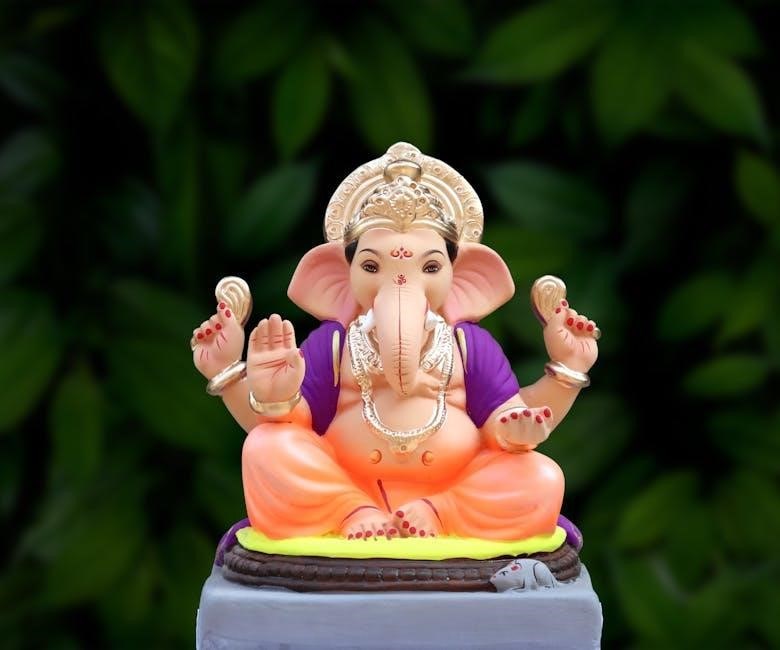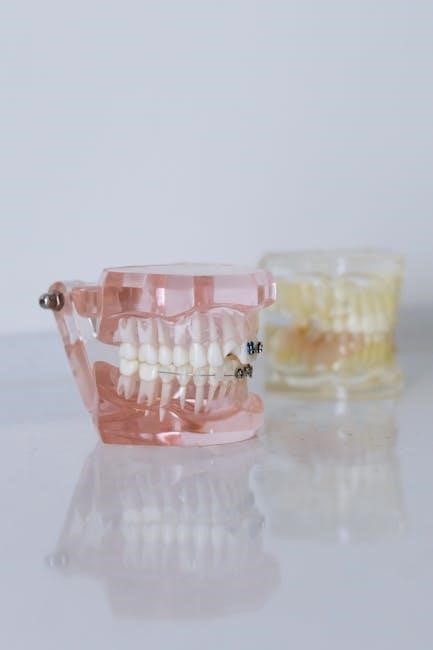Overview of Wisdom Teeth Removal and Pre-Operative Preparation
Wisdom teeth removal is a common surgical procedure requiring careful pre-operative preparation. Proper steps ensure safety‚ reduce risks‚ and promote smooth recovery. Fasting‚ anesthesia guidelines‚ and hygiene practices are essential.
1.1 Importance of Following Pre-Operative Instructions
- Following pre-operative instructions ensures a safe and smooth procedure‚ reducing the risk of complications.
- These guidelines help prevent anesthesia-related issues and promote faster recovery.
- Adhering to instructions avoids delays or cancellations of the surgery.
- Proper preparation minimizes discomfort and ensures the best possible surgical outcomes.
1.2 What to Expect During the Procedure
During wisdom teeth removal‚ you’ll receive local‚ IV‚ or general anesthesia to ensure comfort. The procedure involves making incisions‚ removing bone‚ and extracting the teeth. Afterward‚ the site is stitched‚ and gauze is placed to control bleeding. Recovery begins in the office‚ and you’ll need a caregiver to drive you home and assist with post-operative care.

General Pre-Operative Instructions
Follow all pre-operative guidelines to ensure a smooth procedure. Adhere to fasting rules‚ avoid certain activities‚ and prepare mentally. These steps minimize risks and promote recovery.
2.1 Fasting Requirements Before Surgery
Fasting is crucial before wisdom teeth removal to ensure patient safety. Patients must avoid eating or drinking for at least 8 hours prior to surgery‚ including water‚ coffee‚ and gum. However‚ prescribed medications may be taken with a small sip of water. Adhering to these guidelines helps prevent complications during anesthesia and promotes a smooth procedure. Always follow the surgeon’s specific fasting instructions carefully.
2.2 Medication Guidelines
Medications must be managed carefully before wisdom teeth removal. Patients should consult their surgeon about continuing regular medications. Prescribed pre-medications‚ like antibiotics‚ should be taken as directed‚ often with minimal water. Avoid stopping medications without medical advice. Inform your surgeon about all current prescriptions to prevent complications. Adhering to these guidelines ensures safety and optimal surgical outcomes.

Specific Pre-Operative Instructions
Patients must brush teeth thoroughly before surgery and avoid activities like smoking or drinking. These steps ensure a clean oral environment and reduce surgical risks effectively.
3.1 Brushing Teeth and Oral Hygiene
Brushing your teeth thoroughly the morning of surgery is crucial for maintaining oral hygiene. Avoid swallowing water or toothpaste‚ as this can interfere with fasting requirements. Proper oral hygiene helps minimize surgical risks and promotes a clean environment for the procedure. Ensure your mouth is free from food particles and debris to prevent complications during and after wisdom teeth removal.
3.2 Avoiding Certain Activities
- Avoid eating or drinking for at least 8 hours before surgery to ensure fasting requirements are met.
- Refrain from smoking or using recreational drugs‚ as they can impair healing and interact with anesthesia.
- Do not consume alcohol for 72 hours prior to surgery to avoid complications with anesthesia.
- Wear loose‚ comfortable clothing and avoid jewelry‚ high heels‚ or anything that may interfere with the procedure.

Medications and Pre-Operative Considerations
Prescribed pre-medication and antibiotics may be necessary to ensure safety and effectiveness during surgery. Always follow instructions for medication use to avoid complications and promote healing.
4.1 Prescribed Pre-Medications
Prescribed pre-medication may include antibiotics or pain relievers to prevent infection or inflammation. Patients should take these as directed‚ typically with minimal water‚ to ensure effectiveness and safety during surgery. Always inform your surgeon of all current medications to avoid potential interactions. Adherence to these instructions is crucial for a smooth procedure and recovery process.
4.2 Antibiotics and Their Role
Antibiotics are prescribed to prevent infection‚ especially for impacted wisdom teeth. Patients may receive a dose before surgery‚ typically four pills‚ to be taken with minimal water one to two hours beforehand. This reduces bacterial risks during extraction‚ ensuring a safer procedure and recovery. Always complete the full course as directed by your surgeon to maximize effectiveness and minimize complications.

Anesthesia and Safety Precautions
Anesthesia ensures comfort during wisdom teeth removal. Patients must fast for 8 hours and arrange an accompanying adult for transportation and post-surgery care.
5.1 Types of Anesthesia Used
Various anesthesia types are used for wisdom teeth removal‚ including local anesthesia to numb the area‚ IV sedation for relaxation‚ and general anesthesia for complex cases. Each type ensures patient comfort and safety during the procedure‚ tailored to the complexity of the extraction and individual patient needs.
5.2 Accompanying Adult and Transportation
A responsible adult over 18 must accompany patients undergoing wisdom teeth removal‚ especially with anesthesia. This adult should drive the patient home‚ stay with them post-surgery‚ and assist with recovery. Ensure transportation arrangements are made in advance for safety and compliance with medical guidelines.

Health and Lifestyle Considerations
Pre-existing medical conditions‚ smoking‚ alcohol‚ and recreational drug use can impact surgery and recovery. Discuss these with your surgeon to ensure a safe procedure.
6.1 Existing Medical Conditions
Inform your surgeon about any medical conditions‚ such as diabetes‚ heart disease‚ or bleeding disorders‚ as these may affect anesthesia or surgery. Certain conditions require special precautions or medication adjustments to ensure safety during the procedure. Open communication helps tailor the treatment plan to your health needs‚ minimizing risks and promoting a smooth recovery.
6.2 Smoking‚ Alcohol‚ and Recreational Drugs
Smoking‚ alcohol‚ and recreational drugs can interfere with anesthesia and healing. Stop smoking at least 24 hours before surgery and avoid alcohol and drugs for 72 hours. These substances impair recovery and increase anesthesia risks. Adhering to these guidelines ensures a safer procedure and smoother recovery.

What to Wear on the Day of Surgery
Wear loose‚ comfortable clothing with short sleeves for easy access. Avoid restrictive items like ties or jewelry. Remove nail polish and secure long hair back.
7.1 Clothing and Accessories
Choose loose-fitting‚ comfortable clothing for your surgery day. Opt for a short-sleeved shirt or blouse to facilitate easy access for medical staff. Avoid wearing tight clothing‚ ties‚ or anything restrictive. Jewelry‚ including necklaces‚ earrings‚ and bracelets‚ should be removed to prevent interference during the procedure. Additionally‚ avoid wearing high-heeled shoes and ensure your outfit is simple and practical.
7.2 Removing Nail Polish and Jewelry
Remove all dark nail polish and avoid wearing jewelry‚ including necklaces‚ earrings‚ bracelets‚ and rings‚ to ensure safe monitoring during surgery. This helps prevent interference with medical equipment and allows for accurate readings. Adhering to these guidelines is essential for your safety and the efficiency of the procedure.

Preparing for Recovery
Plan for a comfortable recovery by arranging a quiet space‚ having soft foods ready‚ and ensuring access to prescribed medications and ice packs to minimize swelling.
8.1 Setting Up a Recovery Environment
Create a quiet‚ comfortable space with pillows to elevate your head‚ reducing swelling. Keep essential items like medications‚ water‚ and ice packs nearby. Ensure minimal noise and avoid screens to promote rest. Prepare soft foods and arrange for a caregiver to assist with daily needs during recovery.
8.2 Arranging Caregiver Support
A responsible adult over 18 must accompany you to the office‚ remain during the procedure‚ and drive you home. They should stay with you for several hours post-surgery to monitor recovery and assist with basic needs. Ensure your caregiver is available to help for at least 24 hours. This support is crucial for your safety and proper recovery.

Additional Resources and Information
Explore additional resources for pain management and post-surgery care. Guidelines on dietary recommendations and recovery tips are available to ensure a smooth healing process after wisdom teeth removal.
9.1 Pain Management Options
Managing pain after wisdom teeth removal is crucial for recovery. Options include EXPAREL‚ a long-acting local anesthetic‚ and opioids like oxycodone or hydrocodone. Opioids carry risks of addiction and side effects. Patients should discuss concerns with their doctor and follow instructions carefully to avoid complications and ensure effective pain relief during healing.
9.2 Post-Surgery Dietary Recommendations
After wisdom teeth removal‚ start with a clear liquid diet‚ progressing to soft foods like soups‚ scrambled eggs‚ and puréed meats. Avoid chewing to prevent discomfort. Stay hydrated with water or non-caffeinated beverages. Use a straw cautiously and avoid hot liquids initially. Gradually introduce soft foods‚ ensuring they are mashed or blended. Consider multivitamins to maintain nutrient intake and aim for 8-10 glasses of fluid daily to aid recovery.

Final Checklist Before Surgery
Confirm appointment details‚ ensure fasting requirements are met‚ and arrange a caregiver. Avoid makeup‚ jewelry‚ and tight clothing. Follow medication instructions and remove nail polish. Plan for recovery.
10.1 Confirming Appointment Details
Verify the date‚ time‚ and location of your surgery. Ensure you have the contact information handy and understand the arrival time. Confirm any specific instructions provided by your surgeon‚ such as fasting duration or medication guidelines. If you have general anesthesia‚ ensure an adult accompaniment for transportation and post-op care. Double-check all details to avoid last-minute issues.
10.2 Ensuring All Instructions Are Followed
Adhering to pre-operative instructions is crucial for a safe and successful procedure. Confirm fasting timelines‚ medication guidelines‚ and hygiene practices. Avoid prohibited activities like smoking or drinking. Wear appropriate clothing and remove jewelry or nail polish as directed. Ensure a caregiver is arranged for post-op support. Double-check all requirements to minimize risks and ensure a smooth recovery process.